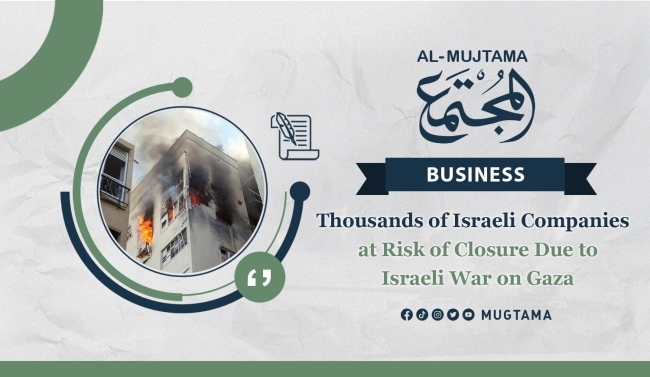Thousands of Israeli Companies at Risk of Closure Due to Israeli War on Gaza Featured
The Impact of the War on Gaza on Israeli Businesses
According to Bloomberg, the ongoing war on Gaza poses a significant threat to thousands of Israeli companies, especially small businesses. If the conflict escalates and extends to other fronts, these companies may face closure.
Challenges Faced by Business Owners
One example is Shlomi Toskia, a businessman whose company, Elativa, is located in Rishon LeZion. Due to the war, his business has almost come to a halt, and he is anxiously waiting for a shift in the commercial tide.
Many small business owners, like Toskia, are struggling due to the radical changes brought about by the call-up of 300,000 reserve soldiers, which is equivalent to 8% of the country's workforce. Additionally, the prevention of Palestinian construction workers and the travel restrictions imposed during the war have further impacted economic activities.
The Immediate Economic Fallout
Toskia experienced immediate economic consequences. He had prepared for one of the busiest times of the year, the period after the Jewish holidays in October. However, instead of reaping profits, he had to request loans to keep his business afloat and cover his living expenses.
Unable to secure loans from banks due to high interest rates and expensive business plans, Toskia borrowed 250 thousand shekels ($66.7 thousand) from the Eugene Association, which specializes in helping small projects and companies at a lower cost.
The Overwhelming Demand for Loans
Eugene CEO, Saji Balasha, stated that they anticipated a surge in demand for loans after the war began. Typically, Eugene lends about $70 million a year, but in the month leading up to November 21 alone, they received applications for $58.2 million. Balasha expects the demand for loans to reach $364.8 million over the next six months.
The Wider Impact on the Israeli Economy
Small and medium enterprises make up 62.3% of the gross value added in Israel, which is higher than the average in the OECD. However, the war on Gaza is taking a toll on the economy.
Projected Business Closures
A survey conducted by Coface BDI for the Marker economic newspaper predicts that approximately 57,000 Israeli companies will close their doors this year, compared to 42,000 in 2022. Many of these closures are attributed to increased inflation and months of political unrest.
Banks' Response and Government Support
The country's five largest banks have increased provisions for credit losses to small businesses by about 8-fold compared to last year. The government has allocated NIS 18 billion ($5 billion) for business continuity grants and offered to guarantee loans in some cases. Finance Minister Bezalel Smotrich extended compensation until December.
Continued Struggles
Even six weeks after the war, a fifth of companies reported that they were still unable to resume operations, according to the Israeli Central Bureau of Statistics. Companies, organizations, and the Federation of Israeli Manufacturers have criticized the government for its handling of the situation.
Balasha emphasizes the need for the government to respond creatively and unconventionally to support businesses during this challenging time.
Source: Bloomberg


